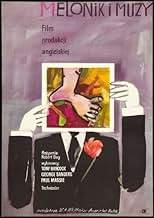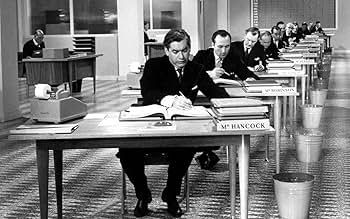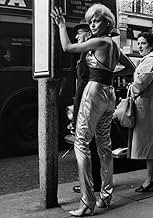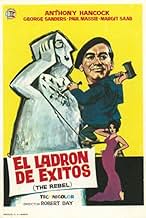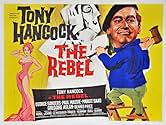The Rebel
- 1961
- 1 h 45 min
AVALIAÇÃO DA IMDb
6,8/10
1,3 mil
SUA AVALIAÇÃO
Adicionar um enredo no seu idiomaTony Hancock gives up his day job to become an artist. He's a lot of enthusiasm, but little talent, and critics dislike his work. Nevertheless, he impresses a talented artist.Tony Hancock gives up his day job to become an artist. He's a lot of enthusiasm, but little talent, and critics dislike his work. Nevertheless, he impresses a talented artist.Tony Hancock gives up his day job to become an artist. He's a lot of enthusiasm, but little talent, and critics dislike his work. Nevertheless, he impresses a talented artist.
- Direção
- Roteiristas
- Artistas
- Indicado para 1 prêmio BAFTA
- 1 indicação no total
Gary Cockrell
- Artist
- (as Gary Cockerill)
Avaliações em destaque
For anybody with a love for Handcock this film is a must see. For those who really know Handcock it is also a farewell as in many ways it could be seen as his last true work? Coming at a time when Handcock was desperately trying to re-invent himself and re mould his style whilst fighting off the blackness of depression the film is a mixture of hope and sadness. If you look behind the laughter and mirth you can see Hancock as he really is - a one of genius never to be repeated. Hancock plays a struggling artist who leaves his London office job to seek his fame and fortune in Paris. Look for the great line between himself and his Landlady Mrs Cravat when Hancock exclaims "Its a self portrait" Mrs Cravat looks and him and asks "Of who?" Handcock is at the end of his line "Who do you think Laurel and Hardy" Lol The film has the usuall Galton and Simpson tight story line and the action is very funny. In my opinion a film which in ever way is on a par with the carry on style genre. Enjoy you wont see the likes of Tony again!
This one is a long-time favourite for its great one-liners, its wit, its bright colours and the sheer joy of its performances. George Sanders plays the creepy critic with the same finesse he'd done many times before, Hancock as the leader of the Infantile school of painting is so preposterous its hysterical, even a very young Oliver Reed appears briefly in the cafe scene. The writing of Galton and Simpson is as sharp as ever but gets to take more detours and turns than it ever could in the Half-Hours ... a brilliant film. I particularly love the pathetic painting of the foot which crops up at the art exhibition and that hideous sculpture. Excellent.
I am 57 now and was weaned when I was a lad on the various BBC tv series of "Hancock's Half Hour in the 1950's.I became an addict there and then.In later life I carefully recorded the repeats on my vcr (not invented when I was a lad), and purchased cassettes of Tony's earlier radio shows whenever a new volume was available for sale.I have read his biography (1924 - his suicide in Australia in 1968), so he was only 44 when he died.Forget he had a drink problem and could be violent.
Yes, he considered he had outgrown his tv series with Sid James (and Kenneth Williams earlier) and even his later solo "Hancock" tv series from 1959 onwards.As a previous literate reviewer has rightly remarked, he hankered after a wider international audience for his comic abilities and appeared in later films like "Those Magnificent Men in their Flying Machines" even trying his hand in Hollywood with Walt Disney but I consider "The Rebel" from 1961 as his funniest film.It incorporates many characters like the existentialist lady on the big screen who have been heard before, e.g. Fenella Fielding in the radio show "The East Cheam Poetry Festival" from 1954.John le Mesurier often played "establishment" figures in his half hour shows and was a personal friend and here he plays Hancock's authoritarian boss in the dreary office where we first see him in an almost synchronised early scene where the clerks all do a similar computation function simultaneously.How we office workers with aspirations of individual creativity empathise with him in his rebellious behaviour!!
A new "Mrs Cravatte" in the shape of Irene Handle (not Patricia Hayes who was merely a char lady in the tv series), provides a female comic foil as Tony's landlady.It is interesting he retains his real name in this feature film, presumably he considered he could effectivly develop his bohemian character from the tv onto the broader canvas.I revisited this film after 20 years or so and laughed out loud in several places.The point already made that American/overseas viewers may be perplexed with his humour is easy to understand and our current UK generation may be left cold by it.My generation however which was reared on a diet of post war food rationing, spivs, watching wealthy Americans in the media, the McMillan type establishment figures in politics and industry, trends in fashion, pop music etc; can so empathise with his humour.I gave it 7/10.
Yes, he considered he had outgrown his tv series with Sid James (and Kenneth Williams earlier) and even his later solo "Hancock" tv series from 1959 onwards.As a previous literate reviewer has rightly remarked, he hankered after a wider international audience for his comic abilities and appeared in later films like "Those Magnificent Men in their Flying Machines" even trying his hand in Hollywood with Walt Disney but I consider "The Rebel" from 1961 as his funniest film.It incorporates many characters like the existentialist lady on the big screen who have been heard before, e.g. Fenella Fielding in the radio show "The East Cheam Poetry Festival" from 1954.John le Mesurier often played "establishment" figures in his half hour shows and was a personal friend and here he plays Hancock's authoritarian boss in the dreary office where we first see him in an almost synchronised early scene where the clerks all do a similar computation function simultaneously.How we office workers with aspirations of individual creativity empathise with him in his rebellious behaviour!!
A new "Mrs Cravatte" in the shape of Irene Handle (not Patricia Hayes who was merely a char lady in the tv series), provides a female comic foil as Tony's landlady.It is interesting he retains his real name in this feature film, presumably he considered he could effectivly develop his bohemian character from the tv onto the broader canvas.I revisited this film after 20 years or so and laughed out loud in several places.The point already made that American/overseas viewers may be perplexed with his humour is easy to understand and our current UK generation may be left cold by it.My generation however which was reared on a diet of post war food rationing, spivs, watching wealthy Americans in the media, the McMillan type establishment figures in politics and industry, trends in fashion, pop music etc; can so empathise with his humour.I gave it 7/10.
Tony is trapped in the drudgery of a 9-5:30 office job. But at night he is an artist who has great talent and vision (he believes). When he decides to quit his job and move to France he falls in with a group of artists who admire the `childlike' quality to his work. However when he passes another artists work off as his own and gets signed by a major agent he begins to get over his head in trouble.
For fans of Hancock's Half Hour on the BBC this film will represent strange new ground an extension of the short concise stories with depression being the overriding source of Hancock's comedy. Here the story sees him less put down and more of a winner this removes a lot of what made him funny.
However the story still has wit as Hancock makes fun of the pretentious art crowd and makes fun of his own inability to paint. However the running time is perhaps too long to sustain and much of the comedy is such that it could easily have been done by anyone rarely is Hancock's unique style allowed material to work with.
Hancock is still good though, and him misfiring is still funny. George Sanders has an interesting role and it's always good to see John Le Mesurier in anything. However at times you can't help feeling that Sid James could have been added somewhere. In fact the whole film would have been better modelled around the format of the TV and radio shows.
Overall this is the film failing it is stretched and, for most of the second half, it's comedy is not the usual Hancock fare that so many loved. It's funny but it'll make you seek out tapes and videos of his classic shows.
For fans of Hancock's Half Hour on the BBC this film will represent strange new ground an extension of the short concise stories with depression being the overriding source of Hancock's comedy. Here the story sees him less put down and more of a winner this removes a lot of what made him funny.
However the story still has wit as Hancock makes fun of the pretentious art crowd and makes fun of his own inability to paint. However the running time is perhaps too long to sustain and much of the comedy is such that it could easily have been done by anyone rarely is Hancock's unique style allowed material to work with.
Hancock is still good though, and him misfiring is still funny. George Sanders has an interesting role and it's always good to see John Le Mesurier in anything. However at times you can't help feeling that Sid James could have been added somewhere. In fact the whole film would have been better modelled around the format of the TV and radio shows.
Overall this is the film failing it is stretched and, for most of the second half, it's comedy is not the usual Hancock fare that so many loved. It's funny but it'll make you seek out tapes and videos of his classic shows.
Of course I am aware that huge numbers of people will see this movie as mildly diverting, an interesting off shoot of a TV character, or a strained attempt to translate a mythic television talent to a medium he wasn't suited to. I know some will find the plat slight. Some may enjoy it but simply feel it isn't all that impressive. Well, this is fine. But I believe that The Rebel is quite simply the finest movie ever made, and I've seen a lot of movies.
What is so great about it ? The colours. The lush score moving from the comic to the romantic with ease. The array of great comic performances. The script which ranges from the profoundly comic to the comically profound.
The struggle of the individual to express his individuality in a world that prefers conformity has been the subject of countless numbers of films. The Rebel is the only film I can think of to mock this tradition while also celebrating it. The character of Hancock drifts between lies and truth while carving out a reputation for himself among the Parisian avant garde. His never reflects on his complete lack of noticeable talent and inability to dedicate himself to the craft but instead creates something of a stir with his infantilism. His bluster is only ever a whisker away from the despair he shows on his opening train journey.
Comedies are often treated as somehow inferior to dramas. It's much more important to treat human suffering with a straight face than take life for the comedy it undoubtably is. Hancock's suffering may not on the face of it seem important or noble, but it is the despair of the insignificant man who wants to be outside of the machine, wants to be important and creative. But despite dealing with this theme the comedy never drifts into pathos. Hancock covers the sadnesses with a jaunty self involvement in which he can place himself securely among the great artists whose every brush stroke is torn from their body.
The satire on modern art may seem a bit obvious but it is never played on for serious effect.
The sideline characters are all magnificent from John Le Mesurier as Hancock's completely unimaginative boss, through Irene Handl on top form as Mrs Cravat who regards all Hancock's efforts as a load of miscellaneous rubbish, to Dennis Price's Jim Smith, eccentric French millionaire.
"Jim Smith ?"
"Oh. You're surprised. I always feel an English name sounds so much more mysterious."
"Oh yes. I knew a Bert Higgins and a Harry Trubshaw once. They were dead mysterious they were."
But it's not just the plotting, the comedy, the acting, and the dialogue that strike me as perfection. The design of the movie. The contrasting of Parisian styles with the bowler hat and umbrellas of Waterloo Bridge. The interior of Paul Ashby's room. The paintings themselves. All these elements compound the sense of joy that watching this film brings.
And for those who watch this film and think that I am talking nonsense. All I can do is to re-iterate Hancock's cry to the elite of the art scene "You're all raving mad. None of you know what you're looking at. You wait til I'm dead. You'll see I was right."
What is so great about it ? The colours. The lush score moving from the comic to the romantic with ease. The array of great comic performances. The script which ranges from the profoundly comic to the comically profound.
The struggle of the individual to express his individuality in a world that prefers conformity has been the subject of countless numbers of films. The Rebel is the only film I can think of to mock this tradition while also celebrating it. The character of Hancock drifts between lies and truth while carving out a reputation for himself among the Parisian avant garde. His never reflects on his complete lack of noticeable talent and inability to dedicate himself to the craft but instead creates something of a stir with his infantilism. His bluster is only ever a whisker away from the despair he shows on his opening train journey.
Comedies are often treated as somehow inferior to dramas. It's much more important to treat human suffering with a straight face than take life for the comedy it undoubtably is. Hancock's suffering may not on the face of it seem important or noble, but it is the despair of the insignificant man who wants to be outside of the machine, wants to be important and creative. But despite dealing with this theme the comedy never drifts into pathos. Hancock covers the sadnesses with a jaunty self involvement in which he can place himself securely among the great artists whose every brush stroke is torn from their body.
The satire on modern art may seem a bit obvious but it is never played on for serious effect.
The sideline characters are all magnificent from John Le Mesurier as Hancock's completely unimaginative boss, through Irene Handl on top form as Mrs Cravat who regards all Hancock's efforts as a load of miscellaneous rubbish, to Dennis Price's Jim Smith, eccentric French millionaire.
"Jim Smith ?"
"Oh. You're surprised. I always feel an English name sounds so much more mysterious."
"Oh yes. I knew a Bert Higgins and a Harry Trubshaw once. They were dead mysterious they were."
But it's not just the plotting, the comedy, the acting, and the dialogue that strike me as perfection. The design of the movie. The contrasting of Parisian styles with the bowler hat and umbrellas of Waterloo Bridge. The interior of Paul Ashby's room. The paintings themselves. All these elements compound the sense of joy that watching this film brings.
And for those who watch this film and think that I am talking nonsense. All I can do is to re-iterate Hancock's cry to the elite of the art scene "You're all raving mad. None of you know what you're looking at. You wait til I'm dead. You'll see I was right."
Você sabia?
- CuriosidadesThe film was a critical and commercial disaster in the United States.
- Erros de gravaçãoWhen the two bodyguards appear on the luxury yacht their shirts are buttoned and unbuttoned showing vests underneath.
- Cenas durante ou pós-créditosThe producers wish to acknowledge the fullest co-operation accorded - somewhat apprehensively - by BRITISH RAILWAYS.
- ConexõesEdited into Urban Myths: Les Dawson's Parisienne Adventure (2020)
- Trilhas sonorasAt Last ! At Last !
(L'Âme des Poètes)
(uncredited)
Music by Charles Trenet
French lyrics by Charles Trenet
English lyrics by Florence Miles
Principais escolhas
Faça login para avaliar e ver a lista de recomendações personalizadas
- How long is Call Me Genius?Fornecido pela Alexa
Detalhes
- Data de lançamento
- País de origem
- Idiomas
- Também conhecido como
- Call Me Genius
- Locações de filme
- Bingham Road railway station, Addiscombe, Croydon, Londres, Inglaterra, Reino Unido(Fortune Green South Station)
- Empresa de produção
- Consulte mais créditos da empresa na IMDbPro
- Tempo de duração1 hora 45 minutos
- Proporção
- 1.66 : 1
Contribua para esta página
Sugerir uma alteração ou adicionar conteúdo ausente

